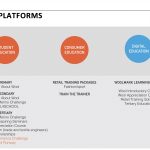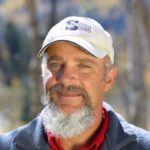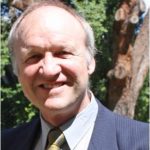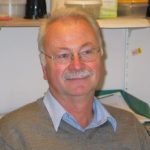The Woolmark Company’s Wool Appreciation Courses are free workshops offering insight into the production pipeline of Merino wool apparel – from fibre to garment – and detail the unique benefits, performance and fabric attributes of wool and wool products. They answer the questions of what is wool, outline the benefits and properties of wool and detail the uses of wool.
Delivered by The Woolmark Company’s technical experts, the Wool Appreciation Courses can be tailor-made for individual companies and educational institutions, using a mixture of cross-media to provide simple and practical explanations of the various processing stages.
These courses are being adapted for on-line learning.
So far two courses are available:
Wool Introductory Course – 25-minute-high level marketing/educative piece.
Wool Appreciation Course – 3-hour piece that looks at the fibre from farm to fashion.
At completion of the Wool Appreciation course you can gain your own Wool Appreciation Badge from Credly. This can be displayed on your own digital professional portfolio such as Linkedin!
This has been a busy week.
Universities
Trustees met with representatives of a number of Universities delivering wool and sheep education. The Trust has been a major financier of the hub and spoke model, wherein UNE provides the hub, and other “spoke” Universities enable their students to engage with the sheep and wool modules offered by UNE.
The good news is that UNE has decided to place Dr Emma Doyle on permanent tenure. Emma was employed by UNE in 2007 in a non-tenured position, funded by AWET. She will now take total responsibility for co-ordinating delivery of AWET’s modules by UNE. In making this decision UNE is demonstrating its continued commitment to sheep and wool education.
AWI was represented at the meeting by Ms Julie Davies who provided all present with an update of education programs AWI is developing, some also co-funded by AWET.
Fashion Schools
We also met with a number of representatives of Australia’s Fashion Schools. AWET has been providing a number of grants for students in these schools to create final year designs strongly based on wool.
AWI was also represented at this meeting by Ms Kelly McAvoy who outlined a number of exciting programs to incentivise fashion school students, here and throughout the world, to increase their involvement with and commitment to wool.
(Click the thumbnail below to view image).
2018 Wool training workshops
A series of wool training workshops will be conducted at Deakin University in May 2018 on behalf of the Australian Wool Education Trust (AWET). The workshops will be delivered at the Institute for Frontier Materials (IFM) at the University’s Geelong–Waurn Ponds Campus, with classes delivered by experts in the various fields. All teaching materials have been developed by Australian Wool Innovation.
The workshops are designed for people working in textile manufacturing to improve their theory skills in wool processing.
Each subject will be delivered in an intensive format of eight hours per day over either one or two days. A formal assessment will be carried out on completion of the workshop.
Subject descriptions
Wool fibre science
This six-hour unit gives a strong overview of the wool fibre. It concentrates on the structure, physics, chemistry, setting and felting of wool. It is a prerequisite for all of the other units offered in this training.
The scouring of raw wool
This two-day unit will cover the opening and scouring of wool fibre. Topics include the preparation of wool for scouring, scouring processes, carbonisation, grease recovery, testing procedures and effluent treatment.
Worsted top-making
This two-day unit looks at the preparation of wool fibres for both worsted and woollen spinning. Topics include fibre opening, blending, worsted carding, carding, drawing, combing and roving. The subject also covers quality assurance of top, TEAM equations and top treatments.
Worsted and woollen spinning
This one-day unit examines the spinning of wool on both the worsted and woollen spinning systems. The unit covers preparation of fibres for preparation of fibres for spinning, woollen carding, worsted spinning, woollen ring spinning, variations and alterations to ring spinning and post-spinning operations. It is recommended that the Worsted top making unit is taken in conjunction with this unit.
The dyeing of wool
This two-day unit covers the dyeing processes of wool. It looks at the way dye interacts with the wool fibre, preparation and dyeing methods for wool and wool blends, equipment used for dyeing, side effects, the dye house laboratory and environmental concerns.
Wool fabric finishing
This two-day unit covers the fabric finishing of wool fabrics. It discusses dry, wet and chemical finishing, typical finishing paths, analysis techniques, faults, performance standards and environmental concerns.
Workshop details
Date |
Course Title |
Lecturer |
| 1st May 2018 | Wool fibre science | Dr Chris Hurren |
| 2nd May 2018 | The scouring of raw wool | Dr Jock Christoe |
| 8th May 2018 | Worsted top-making | Mr Gary Robinson |
| 10th May 2018 | Worsted and woollen spinning | Mr Gary Robinson |
| 15th May 2018 | The dyeing of wool | Dr Rex Brady |
| 17th May 2018 | Wool fabric finishing | Dr Rex Brady |
Enrolment:
Register at Eventbrite using the links above. For questions relating to the workshop please email Chris Hurren (christopher.hurren@deakin.edu.au). The cost of the workshops is $55/workshop. This includes the cost of a printed manual.
Download a copy of the brochure.
Top young WA university research graduates celebrated at agriculture forum
By Sheep Central, 26 March 2018
MURDOCH University graduate Lydia Inglis was awarded the Young Professionals in Agriculture Forum top honours for 2018 in Perth last week.
Lydia, a student at Murdoch University, was awarded an AWET scholarship in 2017. Her thesis was supervised by Associate Professor Andrew Thompson.
Click here to read the abstract for Lydia’s thesis.
Keynote speakers announced:
Animal Production 2018 is excited to announce four keynote speakers invited to speak on innovation, big data, heat stress and consumer demands.
The conference is on 2-4 July in Wagga Wagga NSE>
The program is taking shape! Keynote speakers join the four leading scientists we’ve already announced to present the Memorial Lectures.
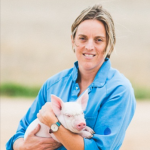 |
Edwina BeveridgeFarmer and Innovator, NSWOPENING SESSION |
Topic: Edwina will highlight the need for innovation in Australia’s livestock industries, drawing on the innovation examples in her own farm system to meet consumer needs.
Edwina and her husband own and operate Blantyre Farms, a 2,200 sow pig farm and a mixed farm of sheep, cattle and crops. In the last ten years, the pig farming operation has doubled in size, plans are underway to continue expansion. In operation for five years, a methane digestion system captures methane gas from pig manure and converts it into electricity. Blantyre also utilises other people’s food waste products for pig feed and saves thousands of tonnes of landfill.
Edwina has a commerce degree from the University of Sydney and is a former chartered accountant turned pig farmer. Edwina is on the board of Australian Pork Limited, the Deputy Chair of the NSW Farmers Pork Committee and is a member of the NSW Primary Industries Ministerial Advisory Committee. She has 3 children, is involved in her local community and is proud to be a farmer.
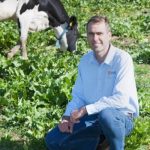 |
Dr Cameron ClarkUniversity of SydneyBIG DATA – WHAT’S THE |
Topic: Dairy farming within boundaries: Taking away complexity whilst adding efficiency through technology
Dr Cameron Clark is enabling a step-change in livestock productivity and welfare both in Australia and internationally through novel, collaborative and interdisciplinary research. This research is changing the global focus of farming towards the individual production animal to improve efficiency and welfare by revealing the value of technology, data and associated advanced precision livestock systems. He plans to expand on this highly innovative research to link the individual production animal and farm practice with the needs of the market and in so doing, add significant value to the food produced in systems that exceed the welfare demands of society. Cameron is a senior research fellow at the University of Sydney.
 |
Dr Jay JohnsonUnited States Department
|
Topic: Evaluating and mitigating the impact of heat stress on livestock well-being and productivity
Dr Jay Johnson is a Research Animal Scientist with the USDA Agricultural Research Service in West Lafayette, Indiana specializing in Environmental Stress and Nutritional Physiology. He received his Bachelor and Masters degrees from the University of Missouri, his PhD from Iowa State University, and completed his postdoctoral training at Purdue University. The overall goal of Dr Johnson’s research program is to evaluate the impact of environmental and production stressors on livestock physiology, welfare, and metabolic health to develop management and nutritionally-based mitigation strategies that will improve animal well-being and productivity.
Specific areas of research include the effects of weaning and transport stress on the well-being of swine provided L-glutamine as an antibiotic alternative, the impact of in-utero heat stress on postnatal productivity and bioenergetics in swine, and the use of rapid versus gradual cooling after extreme heat events.
 |
Prof Wendy UmbergerUniversity of Adelaide, AusCONSUMER DEMANDS |
Topic: Demand for Animal Welfare and Ethical Attributes in Meat: What do consumers really value?
Professor Wendy Umberger is the Foundation Executive Director of the Centre for Global Food and Resources (GFAR) at the University of Adelaide. She was the 2016-2017 President of the Australasian Agricultural and Resource Economics Society (AARES). She is a Fellow of Food Standards Australia New Zealand (FSANZ), serves on the Governance Board of the International Crops Research Institute for Semi-Arid Tropics (ICRISAT) and the editorial board of Applied Economic Perspectives and Policy.
She has spoken globally on topics related to her behavioural economics research, which uses innovative methods to understand drivers and implications of changing consumer and producer behaviour on food systems. She is also studying the impact of urbanisation, modern retail transformation and development programs on food consumption patterns, diet quality and longer-run health and livelihood implications across the region, including Australia, Indonesia, Vietnam and Fiji. She holds a Bachelor of Animal Science (1996) and Masters in Economics (1998) from South Dakota State University and a PhD in Agricultural Economics (2001) from the University of Nebraska-Lincoln. Wendy was raised on a beef cattle and grain farm, which is still owned and operated by her parents in South Dakota USA.
The Trust supports 15 Undergraduate Project Scholarships per year.
These are available to suitable applicants from any University. Each is valued at $7,000 – with $3500 being allocated to the student and the balance to the University to fund its support for the student.
The University and the student may negotiate how these funds will be split and, consequently the split of the funds must be specified in the application.
These scholarships are available to Honours or other appropriate undergraduate students undertaking a one year research project relevant to sheep and wool. This relevance is the most significant criterion considered by the selection panel in assessing applications
Students planning appropriate Masters by Coursework studies can also apply for these scholarships.
Applications for these scholarships must be made directly to the Trust (download application form) and must be supported by an academic referee from the University at which the student is or intends to enrol (download form for academic referee’s reference).
These forms were last updated on 28th October, 2016.
Applications for 2018 scholarships close on Friday 24th November 2017.
IWTO Channel: Published September 13, 2017
Wool is a fiber with endless possibilities. In this video you’ll discover how wool is grown and how wool products are made. You’ll learn about wool’s many natural properties such as flame resistance and breathability, and why wool is the top choice for mountain rescue teams.
You’ll also learn how wool growers and companies respect and care for the environment, producing wool sustainably and with respect for the welfare of wool sheep.
Natural, renewable and biodegradable, wool enhances our lives in so many ways. Fashion, sports and outdoor wear, bedding, carpets, medical textiles and more all benefit from the many natural benefits of wool.
This video was produced by the International Wool Textile Organisation with the support of Armadillo Merino, Woopies, Australian Wool Innovation and The Campaign for Wool.
For more information on wool, sheep, and the wool textile industry, visit www.iwto.org
https://www.youtube.com/watch?v=qAF67yNSn24&feature=youtu.be&a=
Laurence Gatt is a student at Whitehouse Design in Melbourne.
Laurence has provided a preview of his 2017 collection, using fabrics funded by AWET’s grant. AWET has also received story boards of grant recipients from other institutions.
Animal Production 2018 program is all about communicating leading science in improving the productivity and profitability of Australia’s livestock industries.
A key component of the conference program are four prestigous Memorial Lecture presentations. These are invite-only by the conference organising committee based on the recipient’s expertise and contribution to animal science.
We’re pleased to announce the Animal Production 2018 Memorial Lecture recipients …
Dr Fred Provenza
Utah State University, USA
McCLYMONT MEMORIAL LECTURE
Topic: How Palates Link Soil and Plants with Herbivores and Humans
Dr Fred Provenza is Professor Emeritus of Behavioral Ecology in the Department of Wildland Resources at Utah State University. He is a pioneer in understanding foraging behaviour and how behaviour links soils and plants with herbivores and humans. For 40 years, the research undertaken by Fred’s team laid the foundation for behaviour-based management of livestock and wildlife. That work has been an inspiration to researchers in diverse disciplines, including animal behaviour and welfare, wildlife damage science and management, veterinary science, ruminant and human nutrition, chemical ecology, plant ecology and horticulture, landscape restoration ecology, and pasture and rangeland science and management.
These efforts led to the formation in 2001 of an international network of scientists and land managers from five continents, called BEHAVE – Behavioural Education for Human, Animal, Vegetation and Ecosystem Management. They seek to inspire and enable people to understand and use knowledge of behaviour to create relationships that reconcile differences of opinion about how to manage landscapes. With colleagues, he has authored over 250 publications in scientific journals and books and invited to speak at more than 400 conferences. Dr Provenza will bring his perspective on the importance of a diverse diet to animals, and consequently how this impacts on human well-being and the demand for animal-based foodstuffs.
Dr Joao Vendramini
University of Florida, USA
HARRY STOBBS MEMORIAL LECTURE
Topic: Concentrate Supplementation of Grazing Beef Calves: Performance and Metabolic Imprinting
Dr Joao Vendramini, Brazil, received his bachelor degree in agronomy from the University of Sao Paulo, master degree in Animal Sciences from the same institution, and PhD in Forage management in the Department of Agronomy at the University of Florida in 2005. He was assistant professor – Forage Specialist at Texas A&M University from August 2005 to August 2006 before taking his current research and extension appointments in the UF/IFAS Range Cattle Research and Education Center, Florida. Dr Vendramini’s program is dedicated to forage management with emphasis on sub-tropical production systems.
The major area of interest is forage-livestock interface and the impact of forage management on forage and animal production. Dr Vendramini’s research program has generated 3 book chapters; 101 refereed journal articles, 60 non-refereed technical articles, and 100+ abstracts in professional meetings. He has been the principal investigator or co-principal investigator on grants totaling $1.2 million and currently is the chair or co-chair on 3 graduate students committees and serving as a member of additional 3 committees. Dr Vendramini is a member of the American Society of Agronomy, Crop Science Society of America, America Forage and Grassland Council, American Society of Animal Sciences, American Registry of Animal Science Professionals, and Florida Cattlemen’s Association.
Dr David Masters
University of Western Australia, Aus
UNDERWOOD MEMORIAL LECTURE
Topic: Practical implications of mineral and vitamin imbalance in grazing sheep
Dr Masters has more than 30 years’ experience as a scientist and research leader with CSIRO, the University of Western Australia and in private industry. He has a research background in livestock systems, mineral, amino acid and protein nutrition, wool production and livestock-environment interactions. He began his career studying the requirements and utilisation of zinc during pregnancy before working more generally with cobalt, selenium and copper in grazing sheep and later in the development and effectiveness of mineral supplements for ruminants. As a leader of the Livestock Systems program within the Salinity CRC, Dr Masters initiated research into the utilisation of halophytic plants, high in sodium, potassium and chlorides for production.
This research provided the basis for rehabilitation of saline landscapes for productive agriculture in Australia and overseas. More recently he has provided scientific leadership for a national research program investigating the imbalanced intake of sodium, magnesium, potassium and calcium in pregnant sheep grazing young, vegetative crops. Dr Masters was elected as a Fellow of the Australian Society of Animal Production in 2006 and is an Adjunct Professor at the University of Western Australia and an Honorary Fellow with CSIRO Agriculture.
Prof Paul Hemsworth
University of Melbourne, Aus
BARNETT MEMORIAL LECTURE
Topic: Key determinants of animal welfare: animal management and housing design
Prof Hemsworth is a professor at the University of Melbourne and a member of the Animal Welfare Science Centre, a joint centre of the University of Melbourne, University of Adelaide, Department of Economic Development, Jobs, Transport and Resources (Victoria), South Australian Research and Development Institute and Ohio State University. Prof Hemsworth is an agricultural graduate with a PhD in animal behaviour and physiology.
He is most recognised internationally for his research on the role of human-animal interactions on farm and companion animal welfare. Prof Hemsworth, in collaboration with numerous colleagues has studied the influence of a wide range of housing and husbandry practices on common behavioural problems and welfare risks in farm animals. Over his research career, he has published more than 200 refereed journal papers on animal behaviour and welfare. He teaches undergraduate and postgraduate subjects on animal behaviour and animal welfare at the University of Melbourne.
Curtin Students, Emma Watson and Sophie Watson, display their collections in Beijing.
AWET provides 25 grants each year to final year fashion students to assist them to utilise wool fabrics in their final year collections. Two of these students, Emma Watson and Sophie Watson (not related), both from Curtin University in Western Australia, were invited to show their designs in a parade in Beijing.
